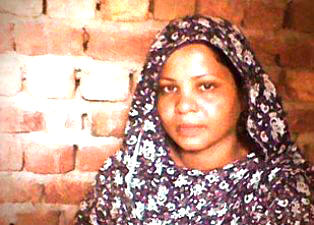Asia Bibi death sentence appeal: Fifth time lucky for Christian mother accused of blasphemy?

Pakistani Christian woman Asia Bibi is due to have an appeal hearing on her death sentence for blasphemy on Tuesday, but will it be cancelled again?
A hearing has been scheduled on four previous occasions only to be cancelled at the last minute by the court.
The last time, it was reportedly postponed when the counsel for the complainant did not turn up.
Bibi, a mother of five, has been in prison since being sentenced to death for blasphemy in 2010. The accusation followed a heated dispute with Muslim colleagues.
Blasphemy is a serious crime in Muslim-majority Pakistan and carries the death sentence, but human rights groups say the charges are often trumped up as a means of settling personal scores and vendettas.
Anyone accused of blasphemy in Pakistan faces threats to their life from extremists. Relatives often have to go into hiding to escape the same fate, and being behind bars doesn't make the accused any safer.
Shahid Khan, vice-chairperson of the Glasgow-based Global Minorities Alliance, said extremists "sometimes march into their prison cell and kill them while the guards turn a blind eye". The authorities then record the death as being down to "bad health" or say simply that the accused was found "mysteriously dead".
The most recent example of a blasphemy accused falling victim to an extra-judicial killing is 65-year-old Khalil Ahmed, a member of the Ahmadiyya Muslim community, who was shot dead by a school boy on 16 May while in police custody.
"One cannot help but wonder how a school boy was able to get access to a prison cell, let alone a gun?" says Khan, adding that the police had most likely colluded in his murder by failing to search the boy, or by granting him access despite carrying a weapon.
"The boy, undoubtedly coerced by others, committed an act of self-administered justice thinking that he is doing a favour to the religious ideology to which he must have been indoctrinated, in a hope to receive praise from the rest of the fold," said Khan.
He fears Bibi's life is "hanging in the balance" and notes that one cleric has put forward a reward of 500,000 Pakistani Rupees, (£3,700, $5,800) for anyone who ends her life.
Khan is anxious that the hearing scheduled for Tuesday should not fall through like all the others. However, the courts are under pressure from extremist and fundamentalist groups.
"The efficiency of any democratic state rests in the institutions that exist to provide unbiased and impartial services to its citizens regardless of their background. Ironically, Pakistan courts succumb to the pressure to provide justice to those accused of blasphemy," he said.
Prime Minister David Cameron raised the human rights issue with Pakistani Prime Minister Nawaz Sharif during his recent visit to the UK, but Khan is sceptical international pressure will be enough to change things for Pakistan's minorities.
In the meantime, Pakistan's religious minorities live out their lives with the constant risk of a false blasphemy accusation.
Khan says there has been a "spike" in blasphemy cases recently. He cites a recent US Commission on International Religious Freedom report, which states there are currently 14 people on death row for blasphemy in Pakistan and another 19 serving life sentences.
While clerics freely incite hatred against minorities with their preaching, Khan says Pakistani society is also responsible for the entrenchment of radicalism because of the way it celebrates those who kill in the name of upholding Islam.
"There is a shocking culture of putting the murderers on a pedestal, garlanding them and naming a mosque or library after them, lauding their killing as holy," he says.
"This admiration of the 'holy murderers' exacerbates religious intolerance, disunity, and damages any efforts towards peaceful coexistence among people from various faith backgrounds.
"This glorification of 'murderers' in Pakistan is a breeding ground for fuelling extremism and fundamentalism. Such a societal attitude is a trap for teenage boys who yearn to gain acclaim from others."
Khan is calling instead for a "rational discourse" to promote interfaith harmony and for peace studies to be included in the national curriculum.
"The culture of persecution against minorities must end and the prosecution of those who misuse blasphemy laws has to be its first priority," he says.
"Only then is there hope that rule of law will prevail and the Pakistan court will exist to provide justice to Aasia Bibi, and those falsely accused of blasphemy."











